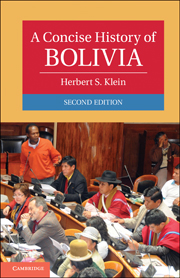Book contents
- Frontmatter
- Contents
- Preface to the Second Edition
- Preface to the First Edition
- 1 GEOGRAPHY AND PRE-COLUMBIAN CIVILIZATION
- 2 THE CREATION OF A COLONIAL SOCIETY
- 3 LATE COLONIAL SOCIETY: CRISIS AND GROWTH
- 4 REVOLUTION AND THE CREATION OF A NATION-STATE, 1809–1841
- 5 THE CRISIS OF THE STATE, 1841–1880
- 6 THE AGES OF SILVER AND TIN, 1880–1932
- 7 DISINTEGRATION OF THE ESTABLISHED ORDER, 1932–1952
- 8 FROM THE NATIONAL REVOLUTION TO THE COLD WAR, 1952–1982
- 9 CREATING A MULTIETHNIC DEMOCRACY, 1982–2002
- 10 THE EMERGENCE OF A MESTIZO AND INDIGENOUS ELITE, 2002–2010
- Political Chronology
- Tables
- Bibliography
- Index
- Titles in the series
Preface to the Second Edition
Published online by Cambridge University Press: 01 June 2011
- Frontmatter
- Contents
- Preface to the Second Edition
- Preface to the First Edition
- 1 GEOGRAPHY AND PRE-COLUMBIAN CIVILIZATION
- 2 THE CREATION OF A COLONIAL SOCIETY
- 3 LATE COLONIAL SOCIETY: CRISIS AND GROWTH
- 4 REVOLUTION AND THE CREATION OF A NATION-STATE, 1809–1841
- 5 THE CRISIS OF THE STATE, 1841–1880
- 6 THE AGES OF SILVER AND TIN, 1880–1932
- 7 DISINTEGRATION OF THE ESTABLISHED ORDER, 1932–1952
- 8 FROM THE NATIONAL REVOLUTION TO THE COLD WAR, 1952–1982
- 9 CREATING A MULTIETHNIC DEMOCRACY, 1982–2002
- 10 THE EMERGENCE OF A MESTIZO AND INDIGENOUS ELITE, 2002–2010
- Political Chronology
- Tables
- Bibliography
- Index
- Titles in the series
Summary
In this fourth version of my history of Bolivia (two editions with Oxford University Press and two with Cambridge University Press) I have been faced with the usual problems of defining periods in contemporary history. As readers of the earlier editions will note, I have been constantly changing the post-1952 periodization. What constitutes key turning points is a continually changing perception among Bolivian historians and social scientists. Thus I have used the election of 2002 as the break between the last two chapters since national commentators have stressed its political significance in presaging the emergence of a new political system. It should be recognized that this periodization does not work for the social and economic trends that clearly straddle this divide, and that this breakdown will most likely be redefined in the future. I also recognize that I am making judgments about contemporary trends in the midst of some very profound changes that are occurring in Bolivian society and polity, and that future historians will see these changes from different perspectives. It is clear that some of these contemporary political, economic, and social changes will lead to unanticipated developments. Although some readers may feel that it is too early to evaluate what has been occurring in the last eight years, I would simply note that I have reached an age when I will not be around to see how this all turns out.
Information
- Type
- Chapter
- Information
- A Concise History of Bolivia , pp. ix - xPublisher: Cambridge University PressPrint publication year: 2011
